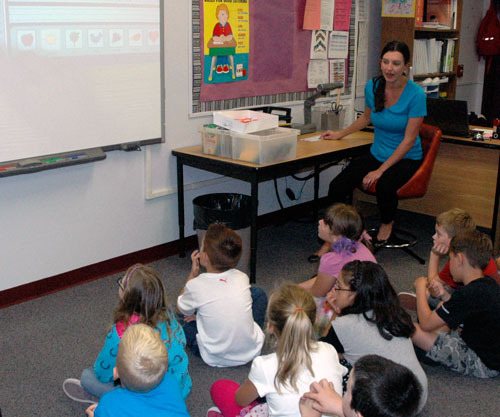LAKEWOOD — Before their new school year could begin on Tuesday, Sept. 3, the Lakewood School District had to prepare a number of new lessons and types of teaching for their students.
Dr. Michael Mack, director of student services and Career and Technical Education for the Lakewood School District, was temporarily filling in for Crystal Knight as principal of Lakewood Middle School as of Wednesday, Sept. 4, and he explained that the school’s sixth-grade students will be focusing heavily on a Science, Technology, Engineering, and Mathematics program in their curriculum.
“We’re combining applied math and science through such approaches as studying energy,” Mack said. “We’ll start with solar, then move onto thermal and wind power, before having the students combine those power sources.”
In addition to having students go on more field trips to learn more outside of the classroom, Mack promised that Lakewood Middle School would offer a more interdisciplinary approach to education, such as by having students write about their energy projects, to boost their literacy and scientific skills at the same time.
“Our seventh and eighth grades will have increased time for literacy in class, to focus more on the fundamentals of reading comprehension and writing,” Mack said. “We’re also really going to focus on math this year. We need to figure out why some students are successful with certain lessons, while others aren’t, so that we can better prepare our lessons.”
Mack touted a school-wide emphasis on “perseverance, of never giving up and continuing to try to their best,” while summing up the school’s enrollment on its second day as “up from the first day of last year, but down from what we normally had last year,” and expressed the hope that the student headcount would continue to increase.
“I’m always happy to see the students come back,” said Mack, whose 33 years in education have included stints as a middle school principal in Stanwood and Lake Stevens. “I’m impressed with how respectful and kind these kids are, and how committed they are to doing their very best. They’re not perfect, but they strive for that, and I love to see their smiles and excitement when they return. Our challenge as educators is to keep that level up throughout the year, and to provide opportunities for them to find success, and to realize and reach their own potential.”
Just south of Lakewood Middle School, English Crossing Elementary had its own set of targets to hit before their first day of school on Sept. 3.
“Our three big ones were the new teacher evaluation system, which was a full day of training, as well as the new writing program, which had its own training, and the new student management system, ‘Time to Teach,’” said Bill Landry, principal of English Crossing Elementary, before laughing, “So we’ve had a lot of training.”
While the writing program is new to English Crossing Elementary, Landry described it as a formalization of instruction methods that a number of the school’s teachers had already employed, but aligned with the Common Core State Standards.
“It’s a more systematic implementation of more effective methods of learning how to write,” Landry said. “It’s about deeper comprehension of writing, and tailoring one’s writing to apply it to a variety of audiences.”
According to Landry, “Time to Teach” training was provided to teachers, paraprofessionals and playground supervisors at English Crossing Elementary on Thursday, Aug. 29.
“Basically, we gave it to anyone who has contact with children at this school,” Landry said. “It’s the explicit teaching of successful behavior, in which we outline our exact expectations and reinforce them continually.”
Landry explained that the staff of English Crossing Elementary will be analyzing and addressing the development of students throughout the year, which he deemed an achievable model due to the cohesion and trust that he ascribed to the staff.
“They know the students and they support each other, so they can get rolling quick in implementing any new material,” said Landry, who expressed pride in the “community feel” of his small school. “Each year, our staff becomes more effective, and each year we’re able to refine our expectations more which makes for a safer and more enjoyable experience for our students.”



